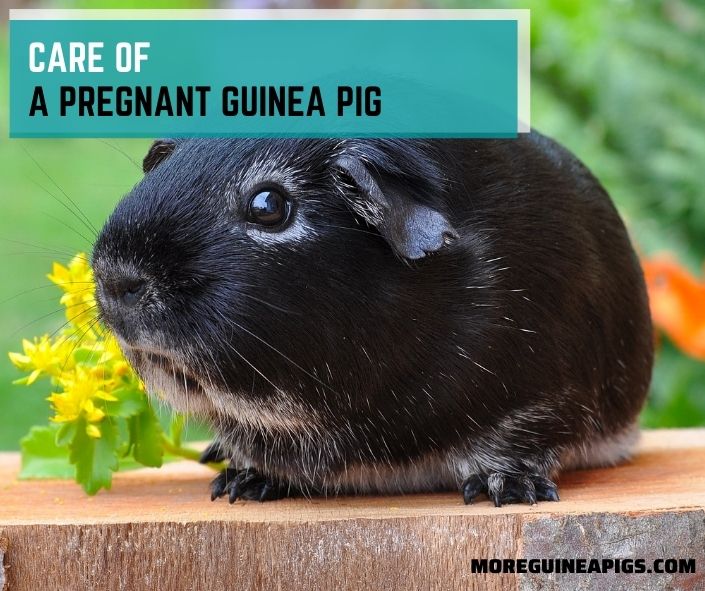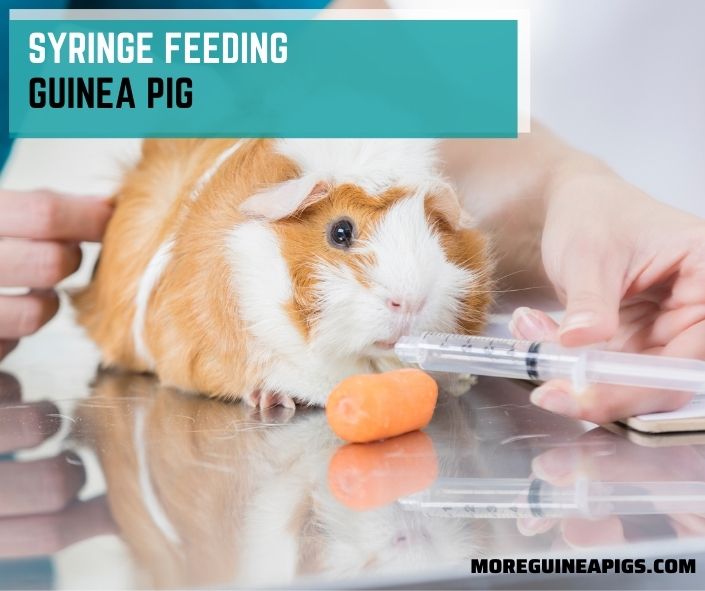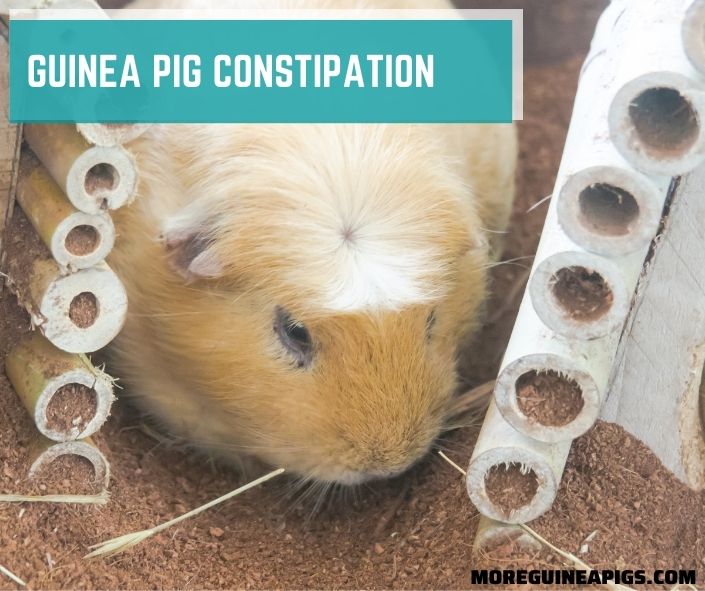Care of a Pregnant Guinea Pig
It’s that period when you need to focus on caring for your pregnant guinea pig. A Guinea pig giving birth to a pup is always an exciting and happy moment for owners in welcoming newborn creatures.
As a caretaker, many tasks await you during the pregnancy period to prepare yourself and the guinea pig for the new arrivals.
When we hear guinea pig pregnancy preparation, we immediately conjure the image of a pregnant piggy about to give birth. However, pregnancy preparation begins even before the pig is bred.
In this article, you will deep-dive into the best age to breed a guinea pig, how to tell if a guinea pig is pregnant, caring for a pregnant guinea pig, helping a guinea pig give birth, etc.
When is the Best Age for Guinea Pigs Pregnant?
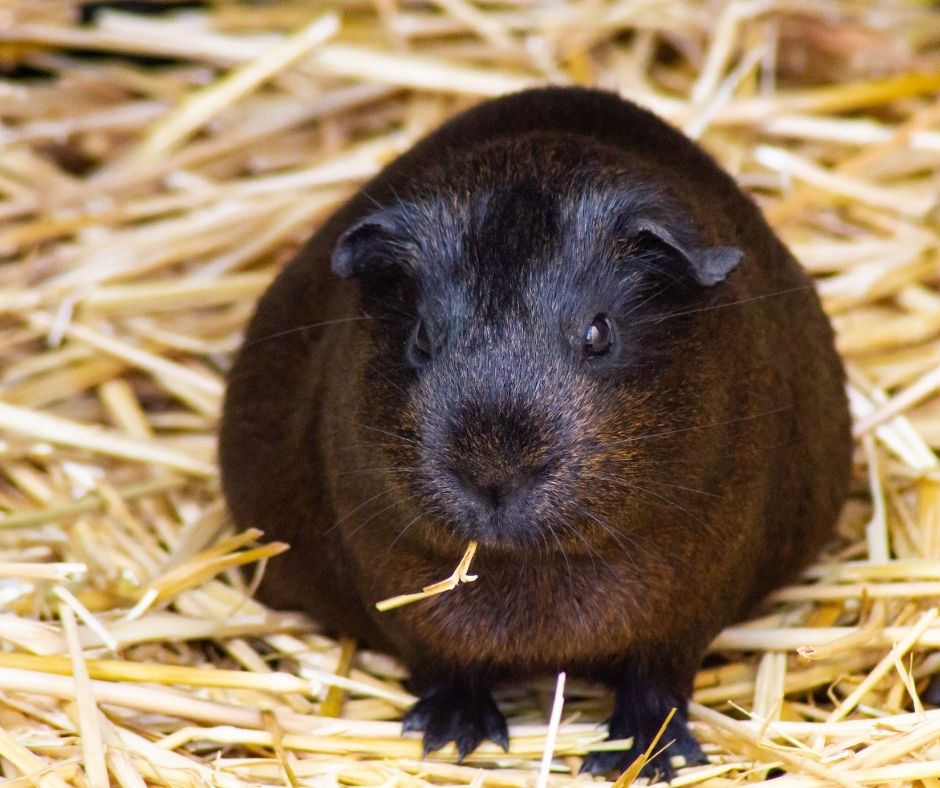
Early breeding of female guinea pigs tends to reduce their lifespan. This is something that every owner needs to avoid.
So then, waiting until the pig is sexually mature is paramount, plus it should not be too old to give birth. If old, your piggy may have to go through a C-section to deliver the pups.
While male piggies (boars) can mate at three months, females should begin mating when they’re 5-6 months old. It’s a wise choice to breed these cavies before they are seven months old to widen their pelvis right before birth.
At eight months of age, the pelvis of a guinea pig female (sow) starts to fuse, and if she hasn’t farrowed before, delivering her pups can be more difficult. Most terribly, you may lose both the sow and her babies.
Some people wonder if sows can get pregnant without mating. But it’s not possible; she has to breed with a boar to conceive.
Pregnant Guinea Pig Facts
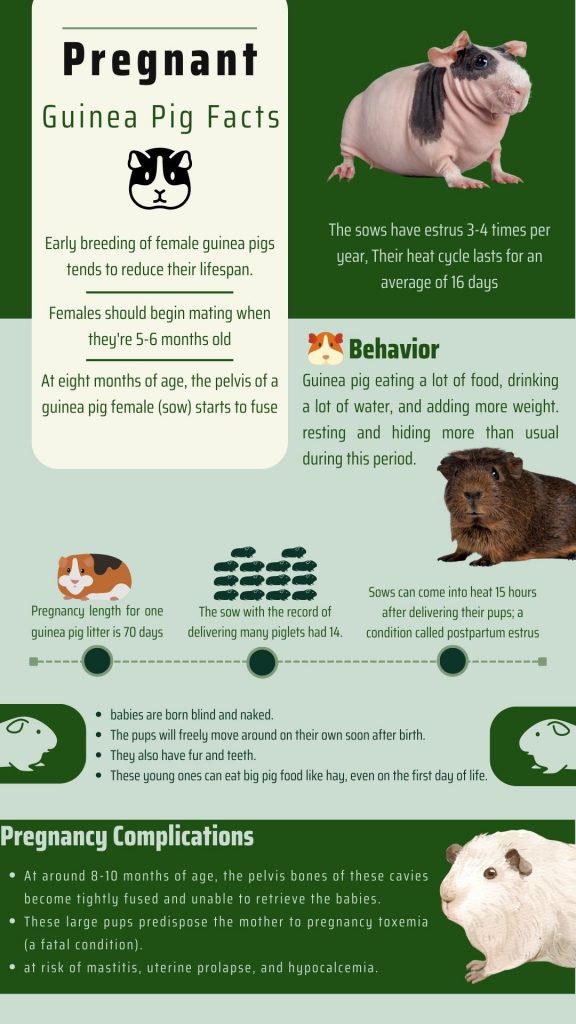
Now you know that age is a primary factor in breeding female guinea pigs to avoid problems with delivery. The sows have estrus 3-4 times per year.
The Estrus cycle in guinea pigs occurs spontaneously. Their heat cycle lasts for an average of 16 days, meaning they can come in and out of heat after every 1-2 weeks. It’s the period when the sow is receptive to a boar.
How will you know if your guinea pig is pregnant? Let’s see! Signs of pregnancy are not visible very soon after mating. If conception is successful, there are many indicators of pregnancy.
Some things will go unnoticed, e.g., your guinea pig eating a lot of food, drinking a lot of water, and adding more weight. If you regularly weigh the pig (e.g., weekly), you will notice substantial weight gain.
She may have doubled her weight when about to give birth. The sow shows a grossly enlarged stomach at around 50-59 days of pregnancy because of the developing pups.
If you gently palpate the stomach side, you should feel lumps under your fingers. That indicates that your guinea pig is pregnant.
Do Guinea Pigs Give Birth Without Pregnant?
Is it possible for a sow to give birth without showing signs of pregnancy? Note that pregnancy signs in guinea pigs aren’t always obvious.
Your sow can be pregnant, and you don’t notice it, or you realize some change of behaviors, e.g., distancing itself and reluctance to move, when she’s close to giving birth.
However, some guinea pigs will exhibit zero indications. It happens when you have no idea your piggy pet is expectant, and it catches you by surprise by giving birth.
You don’t know when the pig got pregnant and still have no clue of its delivery date. You are likely to have such an experience if you house your male and female guinea pigs together.
Pregnant Guinea Pigs Behavior
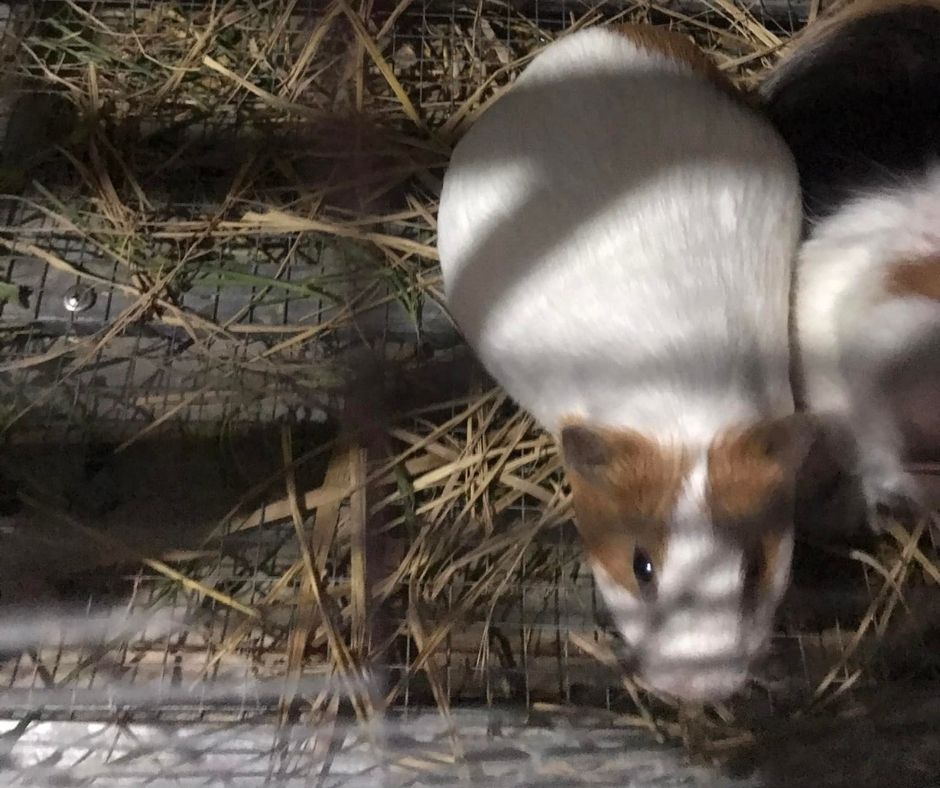
Guinea pigs can shift from their usual behaviors and behave significantly differently when pregnant. For instance, you may realize your piggy is resting and hiding more than usual during this period.
Some guinea pigs may feel insecure being around their cage mates, especially when she perceives threat in their favorite hiding place. It may also happen if the cage is not spacious.
Such a piggy turns out to be defensive or territorial towards others. It is advisable to keep pregnant guinea pigs separately but adjacent to her fellow guinea pig cages to socialize.
How Long Are Guinea Pig Pregnant For?
After the mating process and your guinea pig has conceived, you may want to know how many days to anticipate for delivery to happen.
Well, guinea pigs are small animals and therefore don’t stay long in pregnancy. A female guinea pig is pregnant for 59-72 days. After 8-10 weeks of pregnancy, your piggy should give you young ones.
Note that the guinea pig gestation period decreases with litter size. For instance, the mean pregnancy length for one guinea pig litter is 70 days, while a litter of six guinea pigs can take 67 days.
Sows can come into heat 15 hours after delivering their pups; a condition called postpartum estrus. If mating happens, she will be pregnant and at the same time nursing a litter.
Always have your mother’s guinea pig living separately from a male piggy. Give the female time to raise her young ones alone.
How Many Babies Do Guinea Pigs Have?
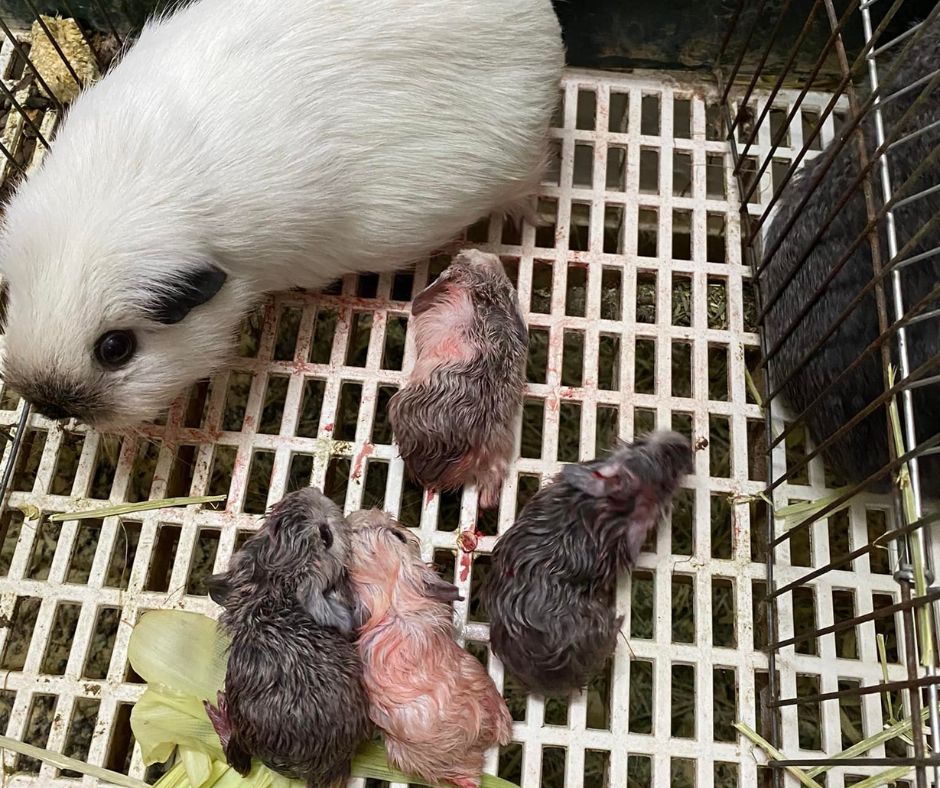
Some guinea pigs are more prolific and can typically give a litter of more than ten piglets. The sow with the record of delivering many piglets had 14.
However, most guinea pigs tend to bear an average litter size of three. So, if your sow gives you two, three, or four pups, it’s still a good sign, and the pig is okay.
The size of the litter varies from one guinea pig to another. Several factors may influence a guinea pig’s litter size, including genetics, boar fertility, gilt management, etc.
Unlike squirrels whose babies are born blind and naked, guinea pigs have precocial young. The pups will freely move around on their own soon after birth.
They also have fur and teeth and behave more or less like their adult counterparts. They squeak too. These young ones can eat big pig food like hay, even on the first day of life.
Guinea Pig Pregnancy Complications
Guinea pigs bred when below seven months of age have a good chance of maintaining pregnancy and giving birth naturally and successfully in the future.
However, a slight delay in breeding, whether by choice or accident, exposes the sow to pregnancy complications. At around 8-10 months of age, the pelvis bones of these cavies become tightly fused and unable to retrieve the babies.
Performing a C-section will be the only solution to remove the babies. Moreover, guinea pigs give birth to large and precocial pups. These large pups predispose the mother to pregnancy toxemia (a fatal condition).
Pregnant guinea pigs may also be at risk of mastitis, uterine prolapse, and hypocalcemia. If your piggy is pregnant, you should give the best level of care. Promptly visit a vet.
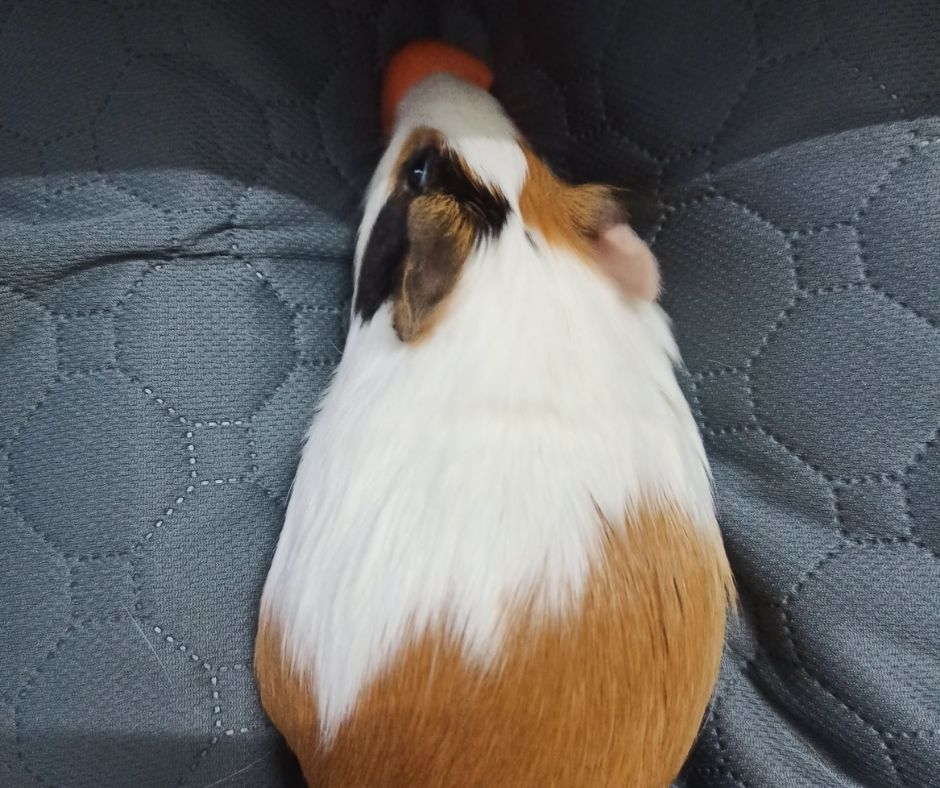
How to Care for a Pregnant Guinea Pig
Caring for a pregnant guinea pig can be tiresome but knowing that you’re anticipating new offspring soon keeps us motivated. The piggy depends on you for all its requirements.
Please pay attention to her diet, housing condition, health, and environment, to ensure they are at their best standard. Good care keeps your pet happy and increases its lifespan.
Feed your pregnant cavy a mixed diet of grass and grass hay, high-quality pellet (explicitly designed for cavies), green leafy vegetables, a small amount of vitamin C-rich foods, e.g., spinach, citrus, etc. Provide fresh water ad libitum.
If you have two pregnant guinea pigs and live peacefully with each other, you may want to keep them in the same cage. It’s a go-ahead! Separate the sow from others if they don’t get along well.
Now that you have a pregnant guinea pig let’s deep-dive into the four best steps to care for the cavy.
Oxbow Animal Health Organic Bounty Adult Guinea Pig Food – All Natural Adult Guinea Pig Food
#1 After She Has Mated Successfully
The early stage of pregnancy in guinea pigs lasts for about one month. Nothing is visible to explain that the pig is pregnant. It’s a stage after fertilization, and the zygote is in its early stage of development.
Some owners are uncertain about their guinea pig being pregnant until they see a vet. The vet will perform a pregnancy diagnosis to ascertain the pig is pregnant.
Pregnancy is likely to change the behaviors of your guinea pig. It may make them lazy and inactive, and some want to be alone.
#2 Caring For Middle Stages of Pregnancy
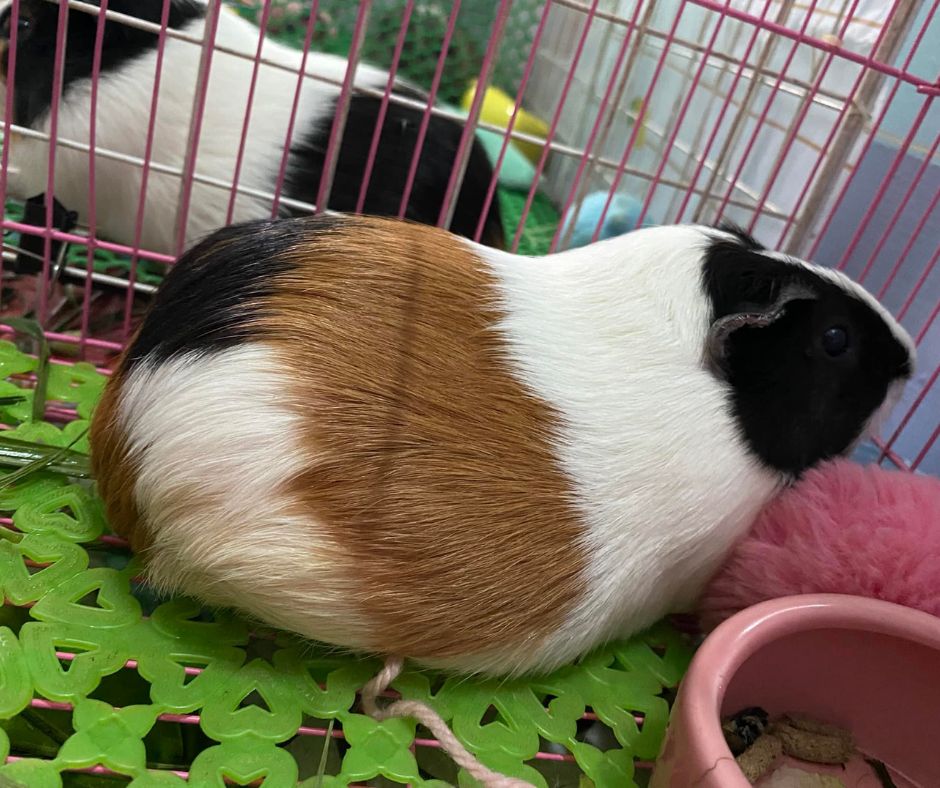
In the middle stages of pregnancy, usually between 5-7 weeks, everything is visible to the eyes.
Your pet piggy’s appetite multiplies, and she starts to eat more than usual. She drinks a lot of water, and the weight gain is noticeable. The pig occupies a lot of space too.
At seven weeks, you can feel lumps if you touch the pig’s stomach side but do it gently. Sometimes you can see the pups moving around the stomach.
Ensure the pig has access to high calcium greens, e.g., spinach, Lamb’s Lettuce, dandelion greens, etc., and plenty of fresh water. Give grass-based feed in large amounts; it supplies the calories that the pig needs.
Likewise, the pig will need hay (timothy hay is a good choice) and some fruits. Quality feeding and proper care of the pregnant guinea pig prepare her for sound delivery.
#3 Caring For Labor and Birth Stages
Soon you will be welcoming innocent newborns into the world. The final stage of gestation can last between 2-3 weeks.
When the pig is close to delivering, the pelvis bones will contract and spread apart. More extra care is necessary during this time. Avoid picking the pig to reduce stress, but provide a comfortable and quiet space.
While some guinea pigs deliver naturally without assistance, some may require medication or a C-section. It’s good for your cavy vet to be present when the pig is delivering to ensure she receives prompt help should there be any problem.
Oxbow Animal Health Alfalfa Hay
#4 After Giving Birth Care
In most cases, a sow will handle her labor, deliver the babies, clean them off, and bite off the umbilical cord.
After delivering, the mother needs nutritional assistance. Alfalfa hay has higher nutritional elements and is helpful for pregnant and nursing guinea pigs. It supplies extra calcium to the mother, and babies need it too.
Give extra veggies and treats to help the mother regain her energy. The pups will also benefit from eating solid food.
How Do You Help a Guinea Pig Give Birth?
Difficulty in giving birth is a common problem with female guinea pigs. It’s important to determine with your cavy vet when your piggy is likely to give birth and monitor her closely in case of any problem.
Pregnancy toxemia or ketosis is a life-threatening condition common with pregnant guinea pigs, especially within a few days of giving birth. It causes the pregnant cavy to have low calcium levels and high blood pressure.
Pregnancy toxemia can kill your pig and her young ones. For safety, working closely with your vet is essential during the whole cycle of your guinea pig pregnancy and in the birth process too.
How Do You Know When a Guinea Pig Is About to Give Birth?
When your guinea pig is about to give birth, signs are fairly apparent during the last two weeks of pregnancy. They will be more evident when it’s one week to the birth process.
When your pig is in labor, you will notice her sitting in the corner of the cage, appearing motionless, and sometimes distances herself from you. The pig loses appetite and seems depressed.
She may start yelping or crying when the contraction of the pelvis bones starts. Another clearly observable sign is the female making hiccup sounds, beginning to crouch down, and licking around her bottom. The babies are on their way out.
How Easy is Guinea Pig Birth?

Typically, guinea pig birth is an easy process if there are no pregnancy complications. Most sows will handle their labor and need no assistance.
The whole birthing process in guinea pigs should take around 30 minutes. The mother will wash down the pups and chew off their umbilical cord. She starts to take care of the babies right away.
However, if the birthing process goes past 30 minutes and some pups are still in the stomach, it may require emergency vet attention.
In scenarios where the sow has a large litter, she may be weary and overwhelmed handling the pups. You can assist your pet.
Assist your piggy by removing the birth sac from the babies’ head and body. Make sure to use a soft and clean towel.
You may also be required to cut the umbilical cord; only use a pair of sterilized scissors or sterilized scalpel blades. Attend one pup at a time, rub it gently to ensure it is breathing, and then put it next to the mother.
Vet Advice
This is rarely needed and is not something I’d advise. There is a risk of introducing infection and causing bleeding. If we do it, we need to tie off the stump on either side with thread.
What Should You Do After the Babies Are Born?
After the whole birth process, make sure to clean your pet’s cage. Sometimes the mother tends to eat the placenta of the pups, but if she hasn’t, remove and dispose of it correctly.
Moreover, remove any other soiled bedding from the area and leave a clean and comfortable room for the mother to care for the young. Guinea pigs show affection to their newborn pups and nurse them immediately.
The babies should suckle colostrum within the first 24 hours; it helps to boost their immunity. Offer veggies and some treats to the mother to help her regain her strength.
The mother stays with her pups and educates them on how things work slowly by slowly. Although, these pups can eat solid foods as early as the first day of life. They will be getting small bits from the mother’s dish.
Personality Thinking: Prevent Pregnancy Complications in Guinea Pigs
If there is a sensitive stage that requires extra care and caution, it is during pregnancy in guinea pigs. Proper knowledge about breeding these animals is important for the survival of the mother and the pups.
Pregnancy ketosis is something to worry about with pregnant guinea pigs. The condition is likely to cause stillbirths and abortions. Difficulty in giving birth is also common if guinea pigs are bred late.
To minimize pregnancy risks, prevent it from the beginning, true to the saying, “prevention is better than cure.” Above all, the least expensive way to avoid breeding is housing your male and female guinea pig separately.
Moreover, neutered males can live together with female guinea pigs. It’s also another way of controlling breeding.
Conclusion
Under normal conditions, the birthing process in guinea pigs is relatively quick. Usually, the mother delivers her pups, wash them down, chew their umbilical cord off, and nurses them.
The duration of a normal birthing process is 30 minutes. Anything above that required an emergency vet’s attention. Guinea pigs have many pregnancy complications that risk losing the babies or sometimes the mother.
Cesarean section or C-section is typical among guinea pigs that were first bred when above eight months old, after fusion of the pelvis bones.
A pregnant guinea pig is also at a higher risk of pregnancy ketosis resulting from appetite loss, large litter size, or underdeveloped blood vessels in the uterus (mostly inherited).
It’s important to be equipped with guinea pig breeding skills and knowledge before you embark on breeding them. That will be a significant step to prevent pregnancy complications these rodents face.
Always keep your male and female guinea pig separately to prevent breeding. If your guinea pig is pregnant, talk with your vet and learn the date it’s likely to give birth. Report any suspected problem right away.
